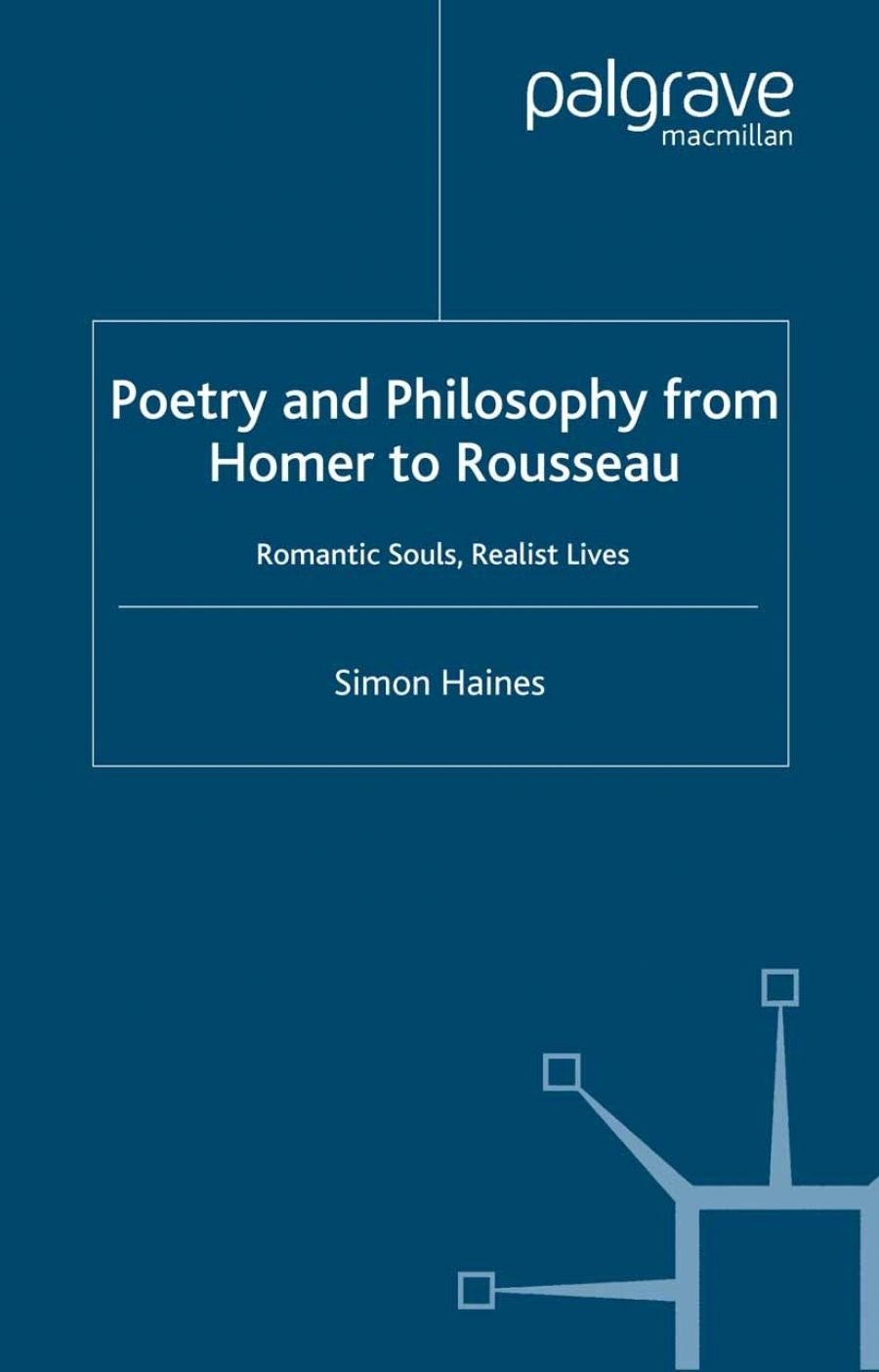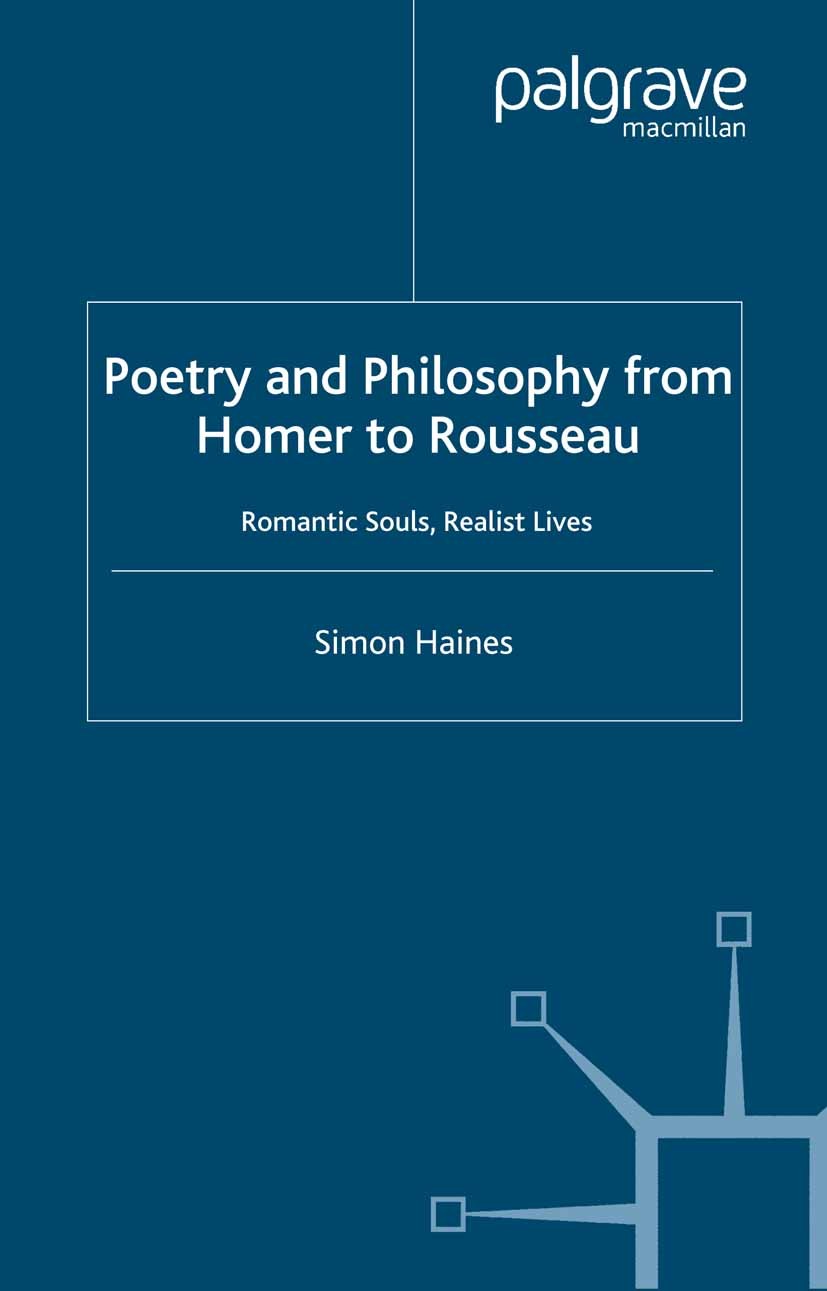
- Free Article: No
- Custom Article Title: Too sensible to catch on
- Review Article: Yes
- Article Title: Too sensible to catch on
- Online Only: No
- Custom Highlight Text:
Simon Haines shot to prominence for an Op-Ed piece in The Australian (9 June 2006) that seemed to enter the lists on the conservative side of the debate about what they teach in English classes these days. If you read carefully, you could tell that the prominence was only going to be momentary, because Haines’s argument was far too nuanced to provoke and maintain the level of polarised hysteria the media appears to expect.
- Book 1 Title: Poetry and Philosophy from Homer to Rousseau
- Book 1 Subtitle: Romantic souls, realist lives
- Book 1 Biblio: Basingstoke, $150 hb, 214 pp, 1403944180
- Book 1 Cover Small (400 x 600):

- Book 1 Cover (800 x 1200):

This is far too sensible and deliberative to catch on. You can’t just shriek it vengefully at your opponents, as it’s the sort of idea you have to go away and work with. Easier by far to revert to the smug conviction that literature provides timeless apolitical truths or its doppelgänger proposition that all culture is political through and through. That it is also far stupider to do so doesn’t seem to worry enough people; at least, not enough people who make a public racket about what the youth of today should be learning in schools and universities.
So, where did this brief and provoking piece of sanity come from? It is not precisely the argument of Poetry and Philosophy from Homer to Rousseau, but the book does enact it in its ethos and approach. This book pays serious and concentrated attention to what literary and philosophical texts have to say. It doesn’t treat them as fetishes against barbarism (the dopey conservative view) or as guilty witnesses to the systemic brutality of dead white male ‘culture’ (the dopey radical view). Haines writes searchingly about being a human, both individually and in groups, both passionately and ideologically. He doesn’t presume to give definitive answers.
I was about to suggest that ‘they don’t write books like this anymore’, but, on reflection, I think the more worrying truth is that ‘they don’t read books like this anymore’. Its 214 pages are tense with argument and analysis, with a sort of compressed eloquence that can carry you from Homer to Romanticism, but which takes time and attention to assimilate. The book is not strictly academic – the footnotes of a thoroughly academic tome covering this much territory would comfortably exceed the space of this whole book – and hopes for an audience among people ‘in the professions and elsewhere, who are looking for conversation of another kind about Homer, Dante, Shakespeare or Rousseau’. I fear that those who read other than professionally are after something less challenging, more immediately appealing and relaxing – the rise and rise of biography seems to tell that story. Equally, I hope I’m wrong because, if you have four half-days to devote to it (don’t try to read it in fragments or in a single hit), this book provides something vastly more satisfying than potted intellectual history. Reading it is to wrestle with the ideas and attitudes of some of the really important writers of Western civilisation’s first couple of millennia.
The core argument concerns a confrontation in literature and philosophy between Romantic and realist conceptions of what it is to be human. Homer is the first realist, seeing the self as composed of body, passions, and linked to others by desires that range from Achilles’ all-engendering wrath to Hector’s rather helpless obedience to family and fate. The realist self (in Aristotle, Shakespeare, Machiavelli, Hume etc.) doesn’t abstract beyond experience. The Romantic self (in Plato, Dante, Rousseau etc.), by contrast, reaches beyond the experiential and social world to something truer and more absolute.
Boiled down this far, the argument doubtless sounds banal, and scarcely novel, but the readings of the texts are not so reductive at all. This book does not deliver neatly packaged thoughts, but, rather, provokes productive thinking. The major work of literary criticism it reminds me of is Auerbach’s Mimesis (1946), not because the arguments are very similar (they are on distinctly different territory), but because it provides you with questions to ask texts, not a method that predicts certain sorts of answers. Haines provides a conversation about and with major texts, not a lecture that interprets them either idolatrously or judgmentally.
Which is not to say that the reader (well, this reader) can resist arguing with Haines on a number of topics. Pretty obviously, he largely dodges engagement with the central debates of recent decades in the humanities, the ones that revolve around class, race and gender. These are ‘loud’ omissions, and to question the book’s readings from those perspectives, if done undogmatically, would lead to interesting places, as well as to some meaningful impasses. An odder absence, given the generally liberal-conservative cast of Haines’s approach, is much sympathy for orthodox but anti-utopian religious thought; the realists in his view are all secular sceptics, and the religious thinkers all Romantic ideologues. Perhaps this is why Montaigne isn’t bigger in the book, or why Milton and Pope are read summarily and, to my mind, very partially. The final chapter that takes us from Descartes to Rousseau might also show signs of this deafness, as it veers towards traditional history of ideas without much leaven of literary analysis. Perhaps Hume needs to be read beside Johnson or Burke, Rousseau beside one of the major Romantic poets.
I really do not mean to present these as quibbles, however. I mean them as taking up my end of the conversation that this wonderfully intelligent work of literary criticism solicits. The ends of literary theory or history may be definitive (or long-lasting) answers, but criticism is at its best when it begs further questions, when it demands fresh engagement. Don’t read Haines to find out what to think; read him, at your leisure if you can, to be inveigled into some vivid critical thinking of your own.


Comments powered by CComment